Vishwajeet Kumar
LMK > CLS: Landmark Pooling for Dense Embeddings
Jan 29, 2026Abstract:Representation learning is central to many downstream tasks such as search, clustering, classification, and reranking. State-of-the-art sequence encoders typically collapse a variable-length token sequence to a single vector using a pooling operator, most commonly a special [CLS] token or mean pooling over token embeddings. In this paper, we identify systematic weaknesses of these pooling strategies: [CLS] tends to concentrate information toward the initial positions of the sequence and can under-represent distributed evidence, while mean pooling can dilute salient local signals, sometimes leading to worse short-context performance. To address these issues, we introduce Landmark (LMK) pooling, which partitions a sequence into chunks, inserts landmark tokens between chunks, and forms the final representation by mean-pooling the landmark token embeddings. This simple mechanism improves long-context extrapolation without sacrificing local salient features, at the cost of introducing a small number of special tokens. We empirically demonstrate that LMK pooling matches existing methods on short-context retrieval tasks and yields substantial improvements on long-context tasks, making it a practical and scalable alternative to existing pooling methods.
Influence Guided Sampling for Domain Adaptation of Text Retrievers
Jan 29, 2026Abstract:General-purpose open-domain dense retrieval systems are usually trained with a large, eclectic mix of corpora and search tasks. How should these diverse corpora and tasks be sampled for training? Conventional approaches sample them uniformly, proportional to their instance population sizes, or depend on human-level expert supervision. It is well known that the training data sampling strategy can greatly impact model performance. However, how to find the optimal strategy has not been adequately studied in the context of embedding models. We propose Inf-DDS, a novel reinforcement learning driven sampling framework that adaptively reweighs training datasets guided by influence-based reward signals and is much more lightweight with respect to GPU consumption. Our technique iteratively refines the sampling policy, prioritizing datasets that maximize model performance on a target development set. We evaluate the efficacy of our sampling strategy on a wide range of text retrieval tasks, demonstrating strong improvements in retrieval performance and better adaptation compared to existing gradient-based sampling methods, while also being 1.5x to 4x cheaper in GPU compute. Our sampling strategy achieves a 5.03 absolute NDCG@10 improvement while training a multilingual bge-m3 model and an absolute NDCG@10 improvement of 0.94 while training all-MiniLM-L6-v2, even when starting from expert-assigned weights on a large pool of training datasets.
Granite Embedding Models
Feb 27, 2025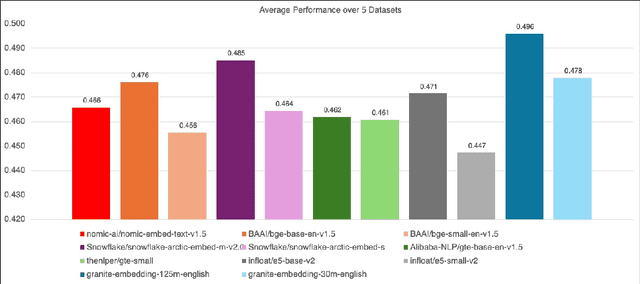



Abstract:We introduce the Granite Embedding models, a family of encoder-based embedding models designed for retrieval tasks, spanning dense-retrieval and sparse retrieval architectures, with both English and Multilingual capabilities. This report provides the technical details of training these highly effective 12 layer embedding models, along with their efficient 6 layer distilled counterparts. Extensive evaluations show that the models, developed with techniques like retrieval oriented pretraining, contrastive finetuning, knowledge distillation, and model merging significantly outperform publicly available models of similar sizes on both internal IBM retrieval and search tasks, and have equivalent performance on widely used information retrieval benchmarks, while being trained on high-quality data suitable for enterprise use. We publicly release all our Granite Embedding models under the Apache 2.0 license, allowing both research and commercial use at https://huggingface.co/collections/ibm-granite.
MILU: A Multi-task Indic Language Understanding Benchmark
Nov 04, 2024



Abstract:Evaluating Large Language Models (LLMs) in low-resource and linguistically diverse languages remains a significant challenge in NLP, particularly for languages using non-Latin scripts like those spoken in India. Existing benchmarks predominantly focus on English, leaving substantial gaps in assessing LLM capabilities in these languages. We introduce MILU, a Multi task Indic Language Understanding Benchmark, a comprehensive evaluation benchmark designed to address this gap. MILU spans 8 domains and 42 subjects across 11 Indic languages, reflecting both general and culturally specific knowledge. With an India-centric design, incorporates material from regional and state-level examinations, covering topics such as local history, arts, festivals, and laws, alongside standard subjects like science and mathematics. We evaluate over 42 LLMs, and find that current LLMs struggle with MILU, with GPT-4o achieving the highest average accuracy at 72 percent. Open multilingual models outperform language-specific fine-tuned models, which perform only slightly better than random baselines. Models also perform better in high resource languages as compared to low resource ones. Domain-wise analysis indicates that models perform poorly in culturally relevant areas like Arts and Humanities, Law and Governance compared to general fields like STEM. To the best of our knowledge, MILU is the first of its kind benchmark focused on Indic languages, serving as a crucial step towards comprehensive cultural evaluation. All code, benchmarks, and artifacts will be made publicly available to foster open research.
NLLB-E5: A Scalable Multilingual Retrieval Model
Sep 09, 2024



Abstract:Despite significant progress in multilingual information retrieval, the lack of models capable of effectively supporting multiple languages, particularly low-resource like Indic languages, remains a critical challenge. This paper presents NLLB-E5: A Scalable Multilingual Retrieval Model. NLLB-E5 leverages the in-built multilingual capabilities in the NLLB encoder for translation tasks. It proposes a distillation approach from multilingual retriever E5 to provide a zero-shot retrieval approach handling multiple languages, including all major Indic languages, without requiring multilingual training data. We evaluate the model on a comprehensive suite of existing benchmarks, including Hindi-BEIR, highlighting its robust performance across diverse languages and tasks. Our findings uncover task and domain-specific challenges, providing valuable insights into the retrieval performance, especially for low-resource languages. NLLB-E5 addresses the urgent need for an inclusive, scalable, and language-agnostic text retrieval model, advancing the field of multilingual information access and promoting digital inclusivity for millions of users globally.
Mistral-SPLADE: LLMs for better Learned Sparse Retrieval
Aug 22, 2024Abstract:Learned Sparse Retrievers (LSR) have evolved into an effective retrieval strategy that can bridge the gap between traditional keyword-based sparse retrievers and embedding-based dense retrievers. At its core, learned sparse retrievers try to learn the most important semantic keyword expansions from a query and/or document which can facilitate better retrieval with overlapping keyword expansions. LSR like SPLADE has typically been using encoder only models with MLM (masked language modeling) style objective in conjunction with known ways of retrieval performance improvement such as hard negative mining, distillation, etc. In this work, we propose to use decoder-only model for learning semantic keyword expansion. We posit, decoder only models that have seen much higher magnitudes of data are better equipped to learn keyword expansions needed for improved retrieval. We use Mistral as the backbone to develop our Learned Sparse Retriever similar to SPLADE and train it on a subset of sentence-transformer data which is often used for training text embedding models. Our experiments support the hypothesis that a sparse retrieval model based on decoder only large language model (LLM) surpasses the performance of existing LSR systems, including SPLADE and all its variants. The LLM based model (Echo-Mistral-SPLADE) now stands as a state-of-the-art learned sparse retrieval model on the BEIR text retrieval benchmark.
Hindi-BEIR : A Large Scale Retrieval Benchmark in Hindi
Aug 18, 2024Abstract:Given the large number of Hindi speakers worldwide, there is a pressing need for robust and efficient information retrieval systems for Hindi. Despite ongoing research, there is a lack of comprehensive benchmark for evaluating retrieval models in Hindi. To address this gap, we introduce the Hindi version of the BEIR benchmark, which includes a subset of English BEIR datasets translated to Hindi, existing Hindi retrieval datasets, and synthetically created datasets for retrieval. The benchmark is comprised of $15$ datasets spanning across $8$ distinct tasks. We evaluate state-of-the-art multilingual retrieval models on this benchmark to identify task and domain-specific challenges and their impact on retrieval performance. By releasing this benchmark and a set of relevant baselines, we enable researchers to understand the limitations and capabilities of current Hindi retrieval models, promoting advancements in this critical area. The datasets from Hindi-BEIR are publicly available.
PrimeQA: The Prime Repository for State-of-the-Art Multilingual Question Answering Research and Development
Jan 25, 2023



Abstract:The field of Question Answering (QA) has made remarkable progress in recent years, thanks to the advent of large pre-trained language models, newer realistic benchmark datasets with leaderboards, and novel algorithms for key components such as retrievers and readers. In this paper, we introduce PRIMEQA: a one-stop and open-source QA repository with an aim to democratize QA re-search and facilitate easy replication of state-of-the-art (SOTA) QA methods. PRIMEQA supports core QA functionalities like retrieval and reading comprehension as well as auxiliary capabilities such as question generation.It has been designed as an end-to-end toolkit for various use cases: building front-end applications, replicating SOTA methods on pub-lic benchmarks, and expanding pre-existing methods. PRIMEQA is available at : https://github.com/primeqa.
Multi-Instance Training for Question Answering Across Table and Linked Text
Dec 14, 2021



Abstract:Answering natural language questions using information from tables (TableQA) is of considerable recent interest. In many applications, tables occur not in isolation, but embedded in, or linked to unstructured text. Often, a question is best answered by matching its parts to either table cell contents or unstructured text spans, and extracting answers from either source. This leads to a new space of TextTableQA problems that was introduced by the HybridQA dataset. Existing adaptations of table representation to transformer-based reading comprehension (RC) architectures fail to tackle the diverse modalities of the two representations through a single system. Training such systems is further challenged by the need for distant supervision. To reduce cognitive burden, training instances usually include just the question and answer, the latter matching multiple table rows and text passages. This leads to a noisy multi-instance training regime involving not only rows of the table, but also spans of linked text. We respond to these challenges by proposing MITQA, a new TextTableQA system that explicitly models the different but closely-related probability spaces of table row selection and text span selection. Our experiments indicate the superiority of our approach compared to recent baselines. The proposed method is currently at the top of the HybridQA leaderboard with a held out test set, achieving 21 % absolute improvement on both EM and F1 scores over previous published results.
Topic Transferable Table Question Answering
Sep 15, 2021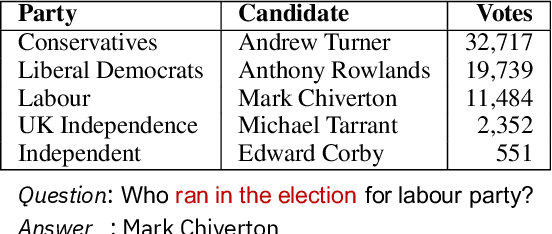
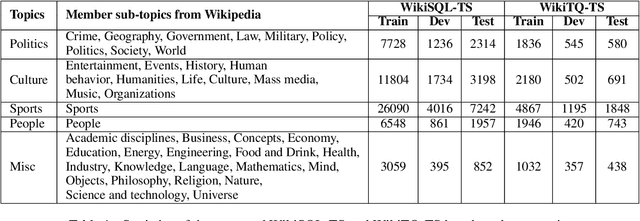
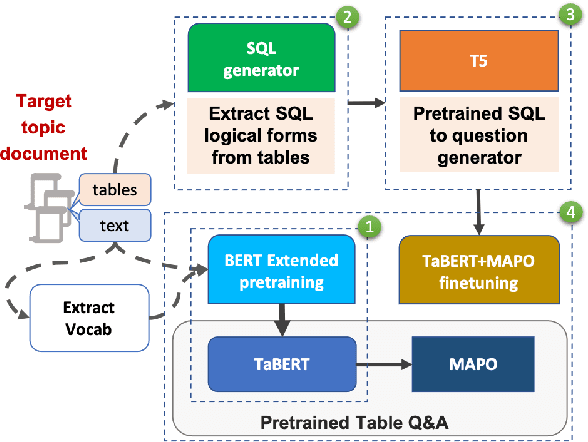
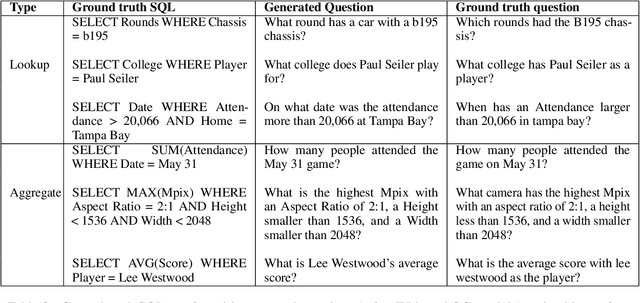
Abstract:Weakly-supervised table question-answering(TableQA) models have achieved state-of-art performance by using pre-trained BERT transformer to jointly encoding a question and a table to produce structured query for the question. However, in practical settings TableQA systems are deployed over table corpora having topic and word distributions quite distinct from BERT's pretraining corpus. In this work we simulate the practical topic shift scenario by designing novel challenge benchmarks WikiSQL-TS and WikiTQ-TS, consisting of train-dev-test splits in five distinct topic groups, based on the popular WikiSQL and WikiTableQuestions datasets. We empirically show that, despite pre-training on large open-domain text, performance of models degrades significantly when they are evaluated on unseen topics. In response, we propose T3QA (Topic Transferable Table Question Answering) a pragmatic adaptation framework for TableQA comprising of: (1) topic-specific vocabulary injection into BERT, (2) a novel text-to-text transformer generator (such as T5, GPT2) based natural language question generation pipeline focused on generating topic specific training data, and (3) a logical form reranker. We show that T3QA provides a reasonably good baseline for our topic shift benchmarks. We believe our topic split benchmarks will lead to robust TableQA solutions that are better suited for practical deployment.
 Add to Chrome
Add to Chrome Add to Firefox
Add to Firefox Add to Edge
Add to Edge